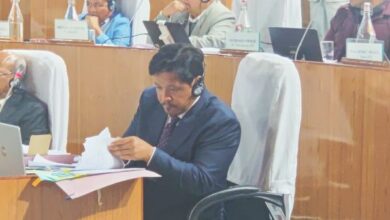Sankardev & future of Assamese society
The relevance of Sankardev and his teachings may achieve another dimension with time

 Change is an inevitable process. And yet, the ideologies of many personalities from centuries ago are still relevant. These are the foundations of our thoughts. The philosophy of Socrates (470–399 BC) is a good example of it.
Change is an inevitable process. And yet, the ideologies of many personalities from centuries ago are still relevant. These are the foundations of our thoughts. The philosophy of Socrates (470–399 BC) is a good example of it.
The same can be said about Sankardev. A nation is born or created on the existing relics or resources in the long run. It is not like the stroke of a pen. Sankardev also enriched his thoughts and ideas borrowing from predecessors such as Madhab Kondoli, Hem Saraswati, Kaviratna Saraswati, Harivar Vipra, Rudra Kondoli etc. All those who acknowledge Sankardev as the architect of Assam have to accept this phenomenon of nation-building.
The term ‘father of a nation’ is also partially relative. So, a new Assamese race may develop on the contributions of Sankardev after hundreds of years.
Recently, one survey was conducted in the UK to ascertain who the greatest Briton was. The major contestants were dramatist William Shakespeare and Prime Minister Winston Churchill during World War II. Most of the non-Britons thought Shakespeare to be the natural choice. But surprisingly the citizens overwhelmingly voted for Churchill. This rare honour is a mere recognition of his unprecedented skilful protection of the country from Nazi aggression.
In the context of Assam, choices could be heroic military General Lachit Borphukan and Chilarai or Koch monarch Nara Narayan and Ahom monarch Sukapha. So, cult figure will appear in every era. In the subsequent centuries, Sankardev and other Assamese icons will be remembered like great ancient characters.
Sankardev in future
Sankardev’s time has already passed nearly 500 years ago. However, sometimes, it seems that the discourse on Sankardev is just beginning. The ideas about the mass philosopher Sankardev are generally inconclusive. The followers consider the ideas from their perspective. Therefore, interesting research will continue forever.
As an Assamese polymath, Sankardev’s influence will remain in all aspects of life as long as a community of this ethnicity lives on Earth.
Socio-economic
Sankardev tried to create a classless society. This idea sprouted during his lifetime. Later, his Brahmin disciple, Damordeva, also refused to practice casteless equality. But with the passing of time and the flow of commodity products, equality and fraternity like the French Revolution gained ground.
How will it be after five hundred or thousand years?
People or even countries are interdependent in modern times. The essential consumer goods and working institutions like various offices are bridging the gap in inequality and casteism. The first community or cooperative service was started in Satra by Sankardev. Satra was a revenue-earning independent institution of medieval Assam. It procured the day-to-day necessities and also catered to the outside public. The cooperative society with moral welfare values will be the Satra of the 26th century in Assam.
The relevance of Sankardev and his teachings may achieve another dimension with time and play the sole role in shaping a society that the saint envisioned.





